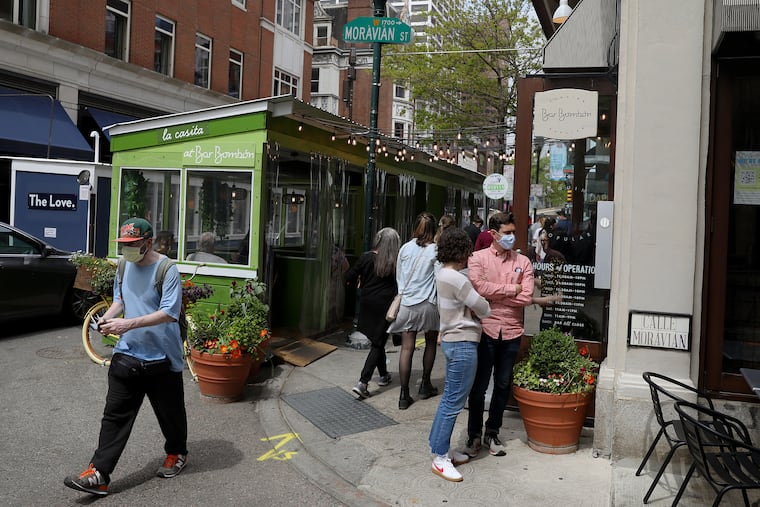Philadelphia announces new streetery regulations and application process
The effort builds on a set of rules released in March that drew ire from many restaurateurs, who said that they could potentially gut the city’s outdoor dining scene.

Philadelphia officials have released new, permanent regulations for streeteries, replacing a temporary set of rules that governed the outdoor, on-street eating areas earlier in the coronavirus pandemic.
Known as the Outdoor Dining Program, the effort builds on a set of rules released in March that drew ire from many restaurateurs, who said that they could potentially gut the city’s outdoor dining scene as it was rebuilding from the pandemic. The permanent rules take into account input from local business owners, residents, and City Council members, the city said in a statement.
Starting next month, restaurants can begin applying for streetery licenses, which are intended for eateries that prepare food for customers to eat on the premises outdoors. According to a licensing guide from the city, the regulations exclude establishments like beer distributors, bottle shops, and take-out restaurants, delis, and convenience stores.
To get a license, owners must have consent from the property owner and $1 million in comprehensive general liability insurance, among other requirements. A $200 application fee will go toward the first annual license cost of $1,750, the city said.
The city now codifies three types of streeteries. Pavement and platform streeteries, which are not enclosed, do not require building permits or approval by the Philadelphia Art Commission, which was a prior requirement. The third type, a structure streetery, is enclosed, and requires a building permit and Art Commission approval to construct. Crash barriers are required for all types.
Streeteries may not use propane or open flames for heating, and cannot run extension cords from the main building for power. Electricity, the city says in an online guide, should come from “batteries or another portable energy source.”
The contentious by-right streetery zones, which permit streeteries in all of Center City and West Philadelphia, as well as several commercial strips in other neighborhoods, remain. According to an Inquirer analysis from December, 62 of 281 restaurants outside the streetery zones missed the cutoff by 500 feet or less.
Restaurants that fall outside of the zones need a special ordinance, and must contact their City Council member to begin the process of getting one. Alternatively, restaurants may be able to apply for a sidewalk cafe license that allows them to have seating on the sidewalk outside the building, rather than in a parking area on the street.
Current temporary sidewalk cafe licenses issued under the city’s emergency outdoor dining plan are set to expire Dec. 31. In a statement, the city urged restaurants to “explore if they are eligible to apply” for a regular sidewalk cafe license.
The new regulations go into effect immediately, but restaurant owners have a grace period to comply, submit applications, and remove noncompliant structures. Many streeteries constructed during the pandemic “do not comply with the permanent regulations and require substantial re-design or total removal,” the city says online.
“To ensure public safety, the streetery program is limited and we urge restaurants to thoroughly explore acceptable outdoor dining options before making any investments,” Mayor Jim Kenney said.